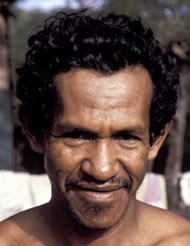Kaili Unde in Indonesia

Photo Source:
Copyrighted © 2026
Anonymous All rights reserved. Used with permission |
Send Joshua Project a map of this people group.
|
| People Name: | Kaili Unde |
| Country: | Indonesia |
| 10/40 Window: | Yes |
| Population: | 33,000 |
| World Population: | 33,000 |
| Primary Language: | Kaili, Unde |
| Primary Religion: | Islam |
| Christian Adherents: | 0.13 % |
| Evangelicals: | 0.13 % |
| Scripture: | Translation Started |
| Ministry Resources: | No |
| Jesus Film: | No |
| Audio Recordings: | No |
| People Cluster: | Kaili-Tomini of Sulawesi |
| Affinity Bloc: | Malay Peoples |
| Progress Level: |
|
Introduction / History
The Kaili Unde live in the mountainous western side of Palu Bay. Some of the Kaili Unde also inhabit the southern part of Donggala and across the mountains to the coast.
The Kaili Unde language is part of a larger linguistic grouping called the Kaili subfamily which also includes the Baras, Kaili Da'a, Kaili Ledo languages. Each of these languages takes its dialect name from its word for "no.
What Are Their Lives Like?
The Kaili Unde live in small villages often comprised of houses on stilts. The coastal Kaili Unde earn a living through hillside agriculture, as well as copra, cacao and palm plantations. Other Kaili Unde make a living as traders and as small scale fishermen.
The Kaili Ledo value family relationships and ancestral traditions very highly. They give great honor and obedience to their parents and elders. The family as a whole makes major decisions together.
When a child reaches the age of 12, he or she begins life as an adult through a ceremony called Nokeso or Noloso. The young person is then given the title Toniasa (adult).
Marriage arrangements reflect a mixture of Islamic and traditional influences. Families of the bride and the groom negotiate the bride price based on the social status of the girl. The Kaili Ledo permit marriage between first cousins. Polygamy is allowed but rare. After marriage, the couple usually lives with one of their families until they have a child.
What Are Their Beliefs?
Most of the Kaili Unde are devout Muslims. They believe they will be judged by their understanding of the Koran and their way of life. At the same time, they have merged traditional animistic beliefs with Islamic teachings. Many still seek the help of a dukun (shaman/healer/occultist) to prevent sickness or to exorcise evil spirits. When a new house is built, the Kaili Unde always give gifts to the good and evil spirits. The bigger the building, the bigger the gift needed.
Their healing ceremonies, which traditionally begin at night and continue through the next afternoon, feature a shaman, a dancer, and a musician playing the lalove, a flute-like musical instrument. Only special blowers are allowed to blow the lalove, and its use is believed to lead hearers to become possessed. Typically, the dancer in the healing ceremonies becomes possessed.
What Are Their Needs?
The Kaili Unde people need assistance to increase the quality and quantity of their crops as well as help in marketing the produce. Formal education in schools as well as exposure to new appropriate technologies could increase their employment opportunities and help them in the development of their local economy.
Prayer Points
Thank God for the beginning of translation work to bring the Bible into the Kaili Unde language. Pray for soon completion of the New Testament and for a hunger among the people for truth.
Ask God to send workers to the Kaili Unde and to direct them to spiritually open people in this group.
Pray for workers who can help with their needs in the areas of education, agriculture and technology.
Pray for freedom from destructive spirits and a willingness to embrace the one who can set them free.
Ask God to raise up a Disciple Making Movement among the Kaili Unde.